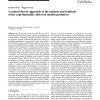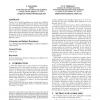147 search results - page 3 / 30 » How an optimal observer can collapse the search space |
ICTAI
2005
IEEE
14 years 15 days ago
2005
IEEE
Partially Observable Markov Decision Processes (POMDPs) provide a general framework for AI planning, but they lack the structure for representing real world planning problems in a...
BC
2005
13 years 6 months ago
2005
Recent experiments on frogs and rats, have led to the hypothesis that sensory-motor systems are organized into a finite number of linearly combinable modules; each module generates...
GECCO
2006
Springer
13 years 10 months ago
2006
Springer
Using a set of model landscapes we examine how different mutation rates affect different search metrics. We show that very universal heuristics, such as 1/N and the error threshol...
ECP
1997
Springer
13 years 11 months ago
1997
Springer
During the planning process, a planner may have many options for refinements to perform on the plan being developed. The planner’s efficiency depends on how it chooses which ref...
CGO
2007
IEEE
14 years 1 months ago
2007
IEEE
Program-specific or function-specific optimization phase sequences are universally accepted to achieve better overall performance than any fixed optimization phase ordering. A ...


